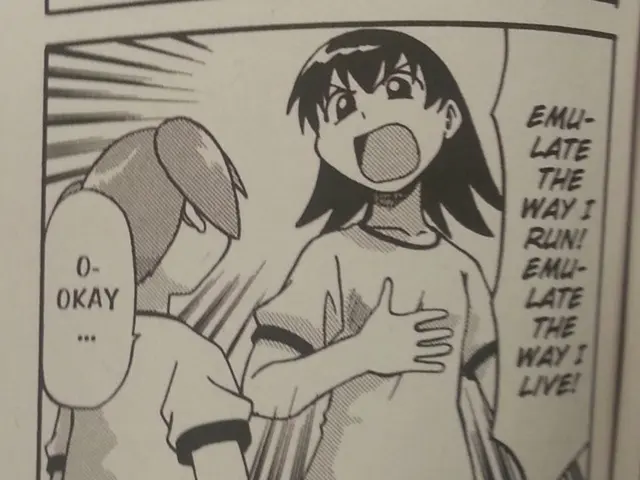Former Germany national team footballer Lina Magull is emerging from her bout with depression.
Article Rewrite:
From Glory to Struggle: Lina Magull, Former Star Footballer, Opens Up About Her Battle with Depression
When you see Lina Magull, you'd never guess she's been wrestling with a severe depression. The ex-captain of FC Bayern, vice-European champion with the German National Team, and one of Germany's most accomplished female footballers, always flashes a contagious smile and a clever quip. But it wasn't always this rosy.
In the podcast "Wie geht's," with footballers Robin Gosens and Nils Straatmann, Magull candidly spoke about her mental health struggles for the first time. Her affliction got so bad that she checked herself into a clinic.
Initially, she didn't understand why she felt this way. "I just thought I was turning into some sort of weird person," she admitted. "I viewed it as weakness. I didn't want to admit that I might be mentally ill. That it was depression." And according to her, the people around her felt the same way. "Nobody wanted to name it," she explained. "They were afraid to name it."
Things took a turn for the worse when her thoughts started to spiral out of control. She couldn't find meaning in life, and seeking help in a clinic was an anxious endeavor for this usually cheerful individual. But after two weeks, she realized, "Yes, I have a depression. A severe one, and that's okay. And from there, I really started to feel better every day."
So much better, in fact, that she made a remarkable return to football. Armed with her doctor's support, she re-joined her team, Inter Milan, two weeks before their first-season game. The season's success was such that Inter finished as vice-champion behind Juventus Turin, qualifying for the Champions League for the first time.
The Weight of Expectations: Struggling Under the Captain's Armband
Magull's mental health issues predate this zeitgeist moment. In 2018, she left SC Freiburg for FC Bayern and became captain in 2020. An "immense honor," as she put it. "I was playing for my favorite club, a team I loved. Everything seemed to fit. And then suddenly, everything felt constricting," she reflected. Struggling to meet the expectations associated with being a captain and the hype following the 2022 European Championship, she started to feel weighed down by the role.
This pressure took a toll on her performance. Contentment became elusive, as she saw only the bad, not the good. Her playing time dwindled, and she felt increasingly distant from the DFB team she had helped win the vice-European title. She questioned herself as a player and a person while battling personal problems, including a broken relationship.
Depression Help and Resources:- The German Depression Help and Suicide Prevention Foundation provides various help resources for those struggling with depression, including immediate support in emergency situations.- Contact a doctor or psychotherapist for consultation. In emergencies, seek help at a psychiatric clinic or call 112. The Social Psychiatric Service offers local support for the mentally ill and their relatives.- The Info-Telefon Depression, a free hotline run by the Depression Help organization, can be reached at 0800 – 33 44 533 during the following hours: Mo, Di, Do 13 – 17 Uhr, Mi and Fr 8.30 – 12.30 Uhr.- The Network for Mental Health offers diverse support options to navigate through crisis periods.- The Federal Association for Burnout and Depression e.V. compiles information on self-help groups, counseling offers, and more on topics related to burnout and depression.
By the 2023/24 season, football was no longer bringing her joy. "I didn't know what to do with myself," she admitted. She stepped down as captain of FC Bayern and left the club on her own accord, moving to Milan. However, her "escapade" only made her illness worse. "After a few weeks, I missed Munich terribly. The problem was, I thought I had lost everything. Family, friends, my position, FC Bayern – the best club in Germany. And I really didn't understand why this was suddenly back in my head," she confessed. "What I had fled from, I suddenly missed again."
A Struggle to Drive On: The Physical Impact of Depression
Sleepless nights, constant worrying, negativity, sweating attacks, and panic attacks – these were the effects depression had on her day-to-day life. "I could hardly drive a car anymore. Things happened where I realized I was losing control of my thoughts and my body. And that terrified me," she recalled, acknowledging the frightening physical manifestations of her mental illness.
Eventually, she mustered the courage to accept her condition and seek treatment – a decision she looks back on positively. She spent six weeks in a clinic and says today, "I'm really glad I was there."
Source: ntv.de, ara
- FC Bayern Munich
- Inter Milan
- Depression
- Football
- Women's Football
- Enrichment Data:
The recovery process for professional footballers grappling with depression can be challenging, owing to the interplay of career, personal life, and mental health factors. Here are some key insights:
- Long-term Effects: Depression can affect an athlete's career, potentially leading to periods of absence and impacting their future progress.
- Mental Health Stigma: Despite increasing awareness, mental health problems like depression still face stigma, which can impact an athlete's personal and professional life.
- Performance Anxiety: Athletes may experience increased performance anxiety as a result of depression, making it harder to deliver peak performance even after treatment.
- Recovery Process: Effective recovery often involves a combination of medication and psychotherapy, with sports psychiatrists and supportive networks playing a crucial role.
- Challenges During Recovery: Ongoing support, adherence to treatment plans, and managing stigma are essential to ensure a successful and sustainable recovery.
- Proactive Care: Leagues are increasingly adopting proactive mental health care, as part of player development programs, focusing on prevention and ongoing support rather than just crisis management.
- Lina Magull, a champion in European leagues with FC Bayern and the German National Team, has shared her personal struggle with severe depression, despite her outgoing nature on the field.
- Magull, the ex-captain of FC Bayern, has been vocal about her mental health battles, particularly the stigma surrounding mental health, which she experienced personally and from those around her.
- In addition to her mental health advocacy, Magull has emphasized the importance of vocational training and personal development, citing her participation in science, health-and-wellness, and women's health initiatives as essential to her overall well-being.
- Following her recovery and a successful stint with Inter Milan, Lina Magull now focuses on vocational training in sports, particularly football, where she hopes to mentor young athletes and help them navigate the unique challenges they may face, including mental health issues.







